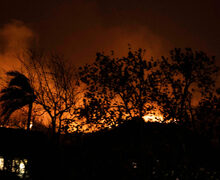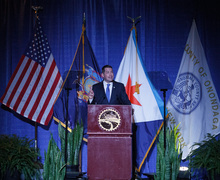Palestinian activist Baha Hilo discusses history, oppression dynamics
Charlie Hynes | Staff Photographer
Hilo explained various aspects of the Israel-Hamas war teaching the foundations of the conflict and its nuances. The lecture was followed by a question and answer segment to help audience members learn more about the region, its people, and his experiences.
Get the latest Syracuse news delivered right to your inbox.
Subscribe to our newsletter here.
A multi-generational group of around 85 community members gathered at the ArtRage Gallery Tuesday night for a workshop led by Palestinian rights activist Baha Hilo, who spoke about the history of the oppression of Palestinian people and the ongoing Israel-Hamas war.
Hilo explained various aspects of the war to help audience members understand foundations of the conflict and its nuances. He also emphasized the negative impact that Israel’s legal system has on the people of Palestine.
“Reality in Palestine has been misrepresented over the past few decades to prevent people from understanding the way it really is, when the reality is very, very simple,” Hilo said. “It really has nothing to do with what’s going on in Palestine, but has everything to do with the presentation of the place or misrepresentation.”
The event was sponsored by the Syracuse Peace Council’s Justice for Palestine committee, and also received support from Syracuse University’s Department of Women and Gender Studies, Jewish Voice for Peace and Veterans for Peace. Tuesday’s event was Hilo’s first stop as a part of a larger tour organized by The Palestine Justice Network of the Presbyterian Church.
Hilo opened the workshop by explaining recent interactions between Palestine and Israel before the ongoing war. He described the dynamics of the region, including the presence of Israeli settlements in the West Bank and the struggles of everyday life.
He also spoke about the treatment of Palestinian civilians by Israeli armed forces and Palestinians’ attempts to rebuild their identities amid violence.
“You can’t revive a living being,” Hilo said. “First you kill it, and then you revive it the way you like.”

Charlie Hynes | Staff Photographer
Hilo emphasized Israel’s legal system as he pomdered various aspects of the conflict. “Reality in Palestine has been misrepresented over the past few decades to prevent people from understanding the way it really is, when the reality is very, very simple,” he said.
Hilo’s lecture was followed by a question and answer segment to help audience members learn more about the conflict.
While he lived in the West Bank, Hilo worked as an educational tour guide for the initiative he co-created in 2013, “To Be There,” he said. The project focuses on educating the public about the struggles of people living in Palestinian territories and spreading awareness about oppression and violence.
Hilo’s touring and speeches were also featured in the documentary film “Israelism,” which depicts changing attitudes of young Jewish Americans amid the Israel-Hamas war.
Julia Ganson, an event organizer and former manager of SU’s Middle East Program, said she attended one of Hilo’s tours over six years ago while conducting research in Palestine. She said his teachings changed her perspective on educating others about Palestinian culture and history.
“You can’t change people’s beliefs. You can’t convince them of things. All you can do is expose them,” Ganson said.
Ron VanNorstrand, the chapter coordinator for Veterans for Peace, said he also attended one of Hilo’s previous tours. After VanNorstrand’s experiences in the West Bank, he spoke at various city engagements to educate the Syracuse community.
He said that during those talks, he discussed similarities between Israel’s treatment of Palestinians and the United States’ treatment of Indigenous people.
“When you care about the women in your neighborhood and you don’t give a damn about Palestinian women being murdered,” Hilo said. “When you care about child rights in your neighborhood, but you don’t give a damn about Palestinians being murdered… there is a problem.”
Published on January 15, 2025 at 12:51 am
Contact Arabella: akklonow@syr.edu






